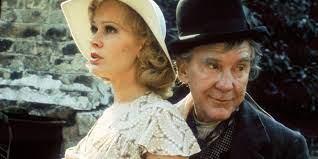
John Schlesinger's The Day of the Locust (1975) has alienated audiences and polarized critics for a half-century; even today, reviewers are split labeling it an unsung masterpiece or a sprawling, unfocused disaster. One would think that Nathanael West's classic satire would fit in snuggly within the genre of Hollywood exposes, from Sunset Blvd. to the recent Babylon. But West's fever dream doesn't translate easily to film, though Schlesinger and a robust team of collaborators certainly try their best.
Artist Tod Hackett (William Atherton) arrives in Hollywood circa 1938, pursuing a career as an art director at Paramount. Tod soon lands him a job designing sets for an elaborate historical epic, though the crass producer's (John Hillerman) corner cutting results in a terrible accident. Tod is drawn to his neighbor Faye Greener (Karen Black), a talentless actress lucky to work as an extra; bored and desperate, she works as a prostitute while flirting with a pair of cowpoke stuntmen (Bo Hopkins and Pepe Serna) and teasing Tod relentlessly. Then Faye catches the eye of Homer Simpson (Donald Sutherland), a meek accountant whose morality and simple kindness make him an easy mark. Faye and Homer develop an exploitative "business arrangement" with tragic results when Homer finally accepts the truth about Faye.
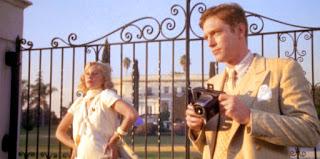
Great novels rarely inspire great films, and The Day of the Locust is no exception. Schlesinger and photographer Conrad Hall do an excellent job recreating the look and feel of prewar Hollywood, with Hall's sun-dappled photography providing an otherworldly sheen to the proceedings. Screenwriter Waldo Salt (who collaborated with Schlesinger on Midnight Cowboy) does a fair job capturing, at least in moments, the atmosphere of seedy hatefulness from West's book. The characters we meet aren't stars or directors but fringe figures who gamble, whore and attend cockfights to kill time between jobs. Tod is invited to a party by his boss, but is disappointed that the lead attraction is a boring stag film. Then again, the chicken-and-tequila date with Faye and her cowboy friends isn't much more appealing, resulting in a brawl and sexual assault that removes any glimmers of romance.
But Schlesinger suffers the pitfalls of adapting a great work of literature, trying to capture West's prose and atmosphere in blunt visuals and dialog. Striking symbols that work on the page (a lizard lounging around Homer's patio, a flower Tod sticks in his earthquake-cracked wall) seem silly as literal filmic images. Schlesinger complements these with ill-judged ironies of his own, as when an angry mob burns pictures of Hollywood stars (get it?), Faye and Tod eat chicken served on newspapers recounting Hitler's Anschluss, or Homer washes melted ice cream down the drain. There's a fine line between poetry and pretension, and Locust stomps all over it.
The book isn't subtle in the first place, but West sold it through the power of his prose and acid humor. Schlesinger and Company stage big set pieces, like the disastrous Waterloo production, with panache but gives them a tragic spin which forfeits West's irony. That Locust has few likeable characters isn't a fatal flaw, but Schlesinger's approach makes the characters become insufferable. Our nominal hero is alternately boring and hateful; Tod loses our sympathy when he assaults Faye, an act the movie justifies by making her a colossal cock-tease. Nor does William Atherton's bland performance smooth over the rough edges in the narrative; he seems like a placeholder for a more memorable performer.
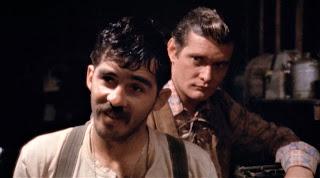
This approach extends to the supporting cast, whom Schlesinger whips into a fever pitch. Good actors like Burgess Meredith (as Faye's vaudevillian dad) and Geraldine Page (a phony faith healer) devour scenery like they're acting in a children's pantomime, which isn't inappropriate for their characters but soon exhausts the audience's patience. Billy Barty (playing Tod's best friend) starts off as likeable and turns into a hateful jerk who loves cockfights and drops racial slurs; Bo Hopkins and Pepe Serna are fine in roles that require them to be surly. Karen Black, a gifted but mercurial actress, struggles to get a handle on Faye who is either a vapid gold-digger or a sincere but shallow ingenue between scenes; her acting style is alternately hysterical and tender, a rapid-fire collage of emotions that just doesn't work.
The one performance which unquestionably works is Donald Sutherland. No stranger to weird or eccentric characters, Sutherland finds a core of earnest humanity in Homer (hailing from Iowa, not Springfield) that his costars lack. Unfortunately, Homer exists for the narrative to dump on him, as the ultimate victim of Hollywood's inhumanity. He's conned by the faith-healing act, shocked when Faye takes him to a drag show and humiliated when she allows her cowboy-beaus to squat in his garage. Homer falls apart when he discovers Faye's infidelity, uttering a tender monolog that does more to humanize him than any other character. Never mind that it seems too articulate for Homer, as written; we're so parched for basic empathy that we'll take it.
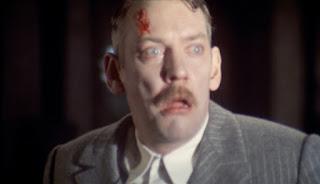
Homer's storyline dovetails with a star-studded movie premiere at Grauman's, where he attempts to reconnect with Faye and instead runs afoul of Adore (Jackie Earle Haley), an obnoxious child star who's spent the whole movie harassing him and Tod. Adore was a minor character in the book who was in the wrong place at the wrong time; in the movie he appears repeatedly, an embodiment of the vapid, arrested adolescence Hollywood encourages. In other words, there's no fate too harsh for the little brat, and here he unwisely volunteers to play the Curley's wife to Homer's Lennie.
The apocalyptic finale at least captures West's climactic chapters. After Homer vents his rage upon Adore, the crowd assembled for the film premiere turns into a savage mob, killing the poor simpleton and rampaging through Hollywood, burning telephone poles, smashing windows and attacking movie stars they turned out to cheer (egged on by a bumptious radio announcer). Even here Schlesinger overstates things, intercutting hallucinations of characters with the Goya-like horror faces sketched by Tod earlier in the film, with his (or Homer's?) distended screams blaring on the soundtrack. But mostly, it works; after two hours of false starts, Schlesinger finally captures West's tone of angry hysteria. Hollywood is less an amoral Babylon than a Boschian hell, deserving only destruction.
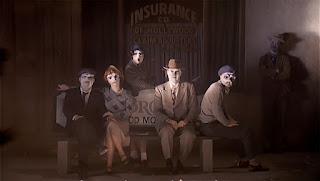
It's wrong to call The Day of the Locust a failure, in the usual sense. It's a well-made film, full of striking scenes and memorable imagery (not to mention John Barry's lush score); even the acting isn't bad so much as ill-suited to the material. But neither is it an overlooked gem, with too many flaws and head-scratching dramatic choices to engage casual viewers. Some stories just work better on page than screen, and Locust's overripe affectations can't elevate it beyond a good try.

